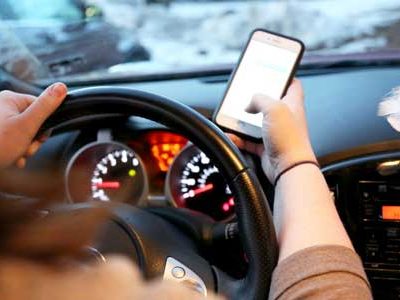Establishing Liability in Driver Inattention Claims
Most of us are creative multitaskers. A friend once told me she could cook dinner, feed her infant son, drink a glass of milk, and yell at her older children at the same time. But driving requires concentration. When motorists multitask behind the wheel, people often get hurt.
In fact, according to the National Institutes of Health, driving while distracted is like driving while drunk or high. These people know they should not get behind the wheel, yet they do so anyway. Thus, they intentionally put other people at risk. Damages tend to be particularly high in these behavioral negligence matters.
Depending on the facts, there are several ways for a Marietta personal injury attorney to establish liability for damages. These damages normally include compensation for economic losses, such as medical bills, and noneconomic losses, such as pain and suffering.
What is distracted Driving?
“Distracted driving” is an umbrella terms which covers a wide range of behaviors. Scientifically, these behaviors include:
- Visual distraction (taking one’s eyes off the road),
- Cognitive distraction (taking one’s mind off driving), and
- Manual distraction (taking one’s hand off the wheel).
Hand-held cell phones combine all three types of distraction, which is largely why Georgia lawmakers passed a hands-free law. More on that below.
Inattentive driving is not limited to hand-held cell phones. Hands-free phones are distracting, as is eating while driving, adjusting the air conditioner while driving, and other behaviors. More on these things below as well.
Georgia’s Limited Hands-Free Law
Section 40-6-241.2 of the Georgia Code took effect in July 2018. Though touted as a “hands-free law,” it is much more complex than that.
Noncommercial drivers over 18 cannot text and drive. “Texting” means sending or reviewing any text-based communication, such as a social media post, email, or telephone text message.
Commercial drivers, like truck drivers, cannot hold a cell phone or reach for a cell phone. So, as far as these drivers are concerned, the law is a true hands-free law. This law may also apply to Lyft, Uber, and other rideshare drivers. The law has the same provisions with regard to noncommercial drivers under 18.
Since 40-6-241.2 is a relatively new law, police officers very aggressively write up these violations. Typically, new laws involve informal grace periods. Officers give drivers a few months to get used to the law. That grace period, if it existed at all, is gone now.
If the tortfeasor (negligent driver) violates a safety law and that violation substantially causes injury, the tortfeasor could be liable for damages as a matter of law.
Georgia’s Distracted Driving Law
The negligence per se doctrine could apply in other distracted driving crashes as well, because of Section 40-6-241. This law states that a driver “shall exercise due care in operating a motor vehicle on the highways of this state and shall not engage in any actions which shall distract such driver from the safe operation of such vehicle.”
In 2015, an Atlanta police officer ticketed a driver for an unusual 40-6-241 violation: eating while driving. Madison Turner was enjoying a McDonald’s Double Quarter Pounder with Cheese. Turner successfully challenged the citation in court. “Maybe if you had a giant pizza in both hands and you weren’t holding the wheel, or maybe if you had a watermelon – half watermelon – and you were just diving into it holding it with both hands, maybe that would be something,” he said at the time.
In civil court, the negligence per se shortcut might still apply even if the tortfeasor was not convicted of the driving or other violation. The civil jury determines all the facts, including guilt or innocence in a criminal matter. That finding is obviously not binding in criminal court.
Officers often issue 40-6-241 citations after crashes for liability purposes. If one driver gets a ticket, it’s easier for the insurance company to fault that driver. That means less paperwork for the department.
Apropos of nothing, there is a difference between fault at the scene and liability for damages. Fault does not take legal doctrines, like contributory negligence and last clear chance, into account. Furthermore, officers often have limited evidence when they assess fault. So, no matter what the police report says, if you were hurt in an accident, an attorney should always evaluate your case.
Driver Inattention and Ordinary Negligence
If police do not issue a citation for a safety violation (citations for things like expired registration stickers do not count), the victim/plaintiff may use ordinary negligence to establish a claim for damages. Ordinary negligence is basically a lack of reasonable care.
A hands-free cell phone is a good example. If the tortfeasor was using such a device at the time of a crash, officers will almost certainly not issue a 40-6-241 citation. However, there is some evidence that hands-free phones are just as dangerous as hand-held phones.
Hands-free phones are always visually and cognitively distracting. They may be manually distracting as well, depending on how the driver uses the device. Yet there is a persistent myth that “hands-free” is synonymous with “risk-free.” As a result, drivers who use hands-free devices are not just dangerously distracted. They also have a false sense of security, so they may take additional risks.
It is difficult, but not impossible, to prove driver inattention in situations like the aforementioned cheeseburger stop. The victim/plaintiff must establish that the distraction was so bad that it constituted a lack of ordinary care. Jurors probably would not reach that conclusion in situations like quick radio or air conditioner adjustments.
Ordinary negligence claims consist of legal duty, breach of that duty, cause in fact, proximate cause (foreseeability), and actual damages.
Work with an Assertive Lawyer
Distracted driver crash victims have multiple legal options. For a free consultation with an experienced personal injury attorney in Marietta, contact The Phillips Law Firm, LLC. You have a limited amount of time to act.



